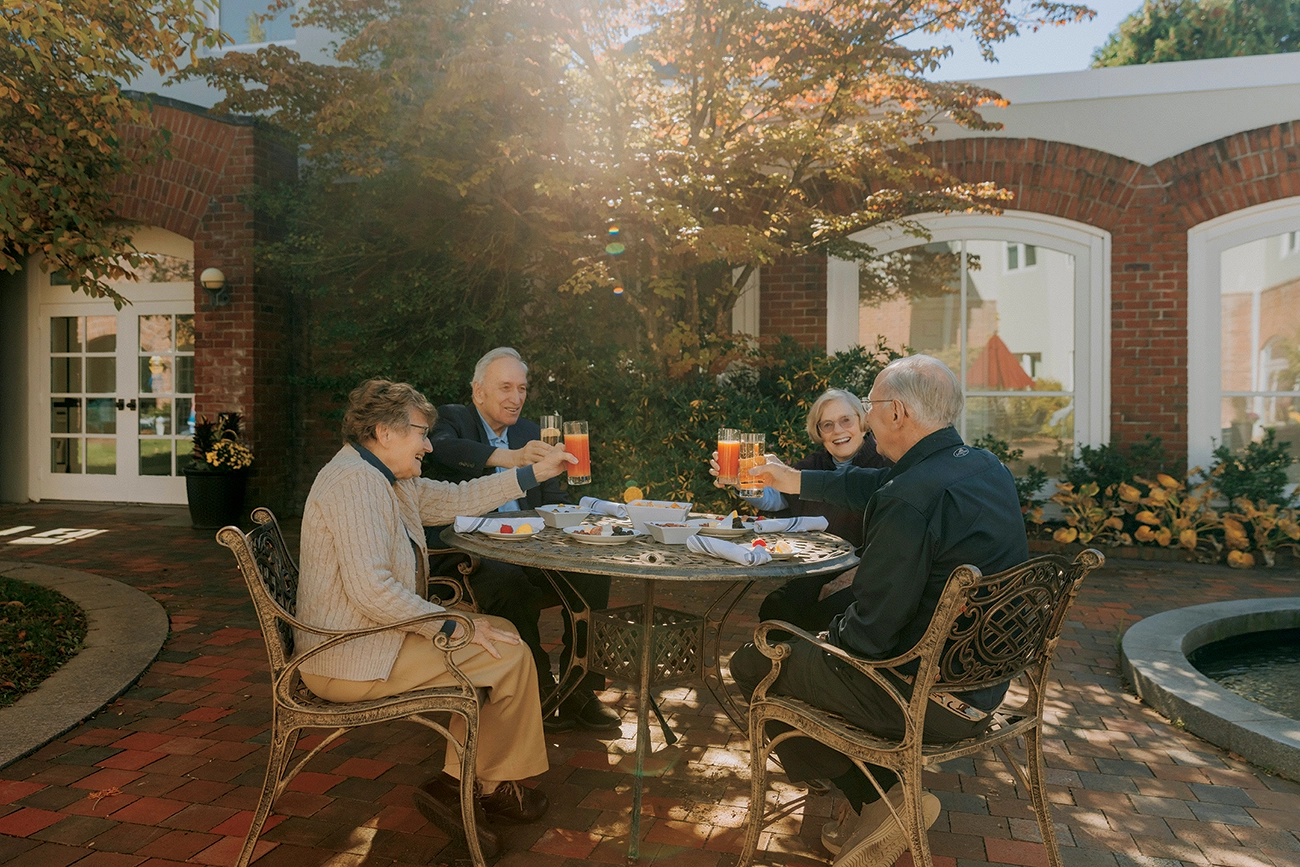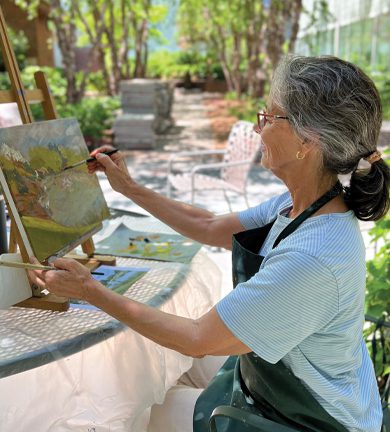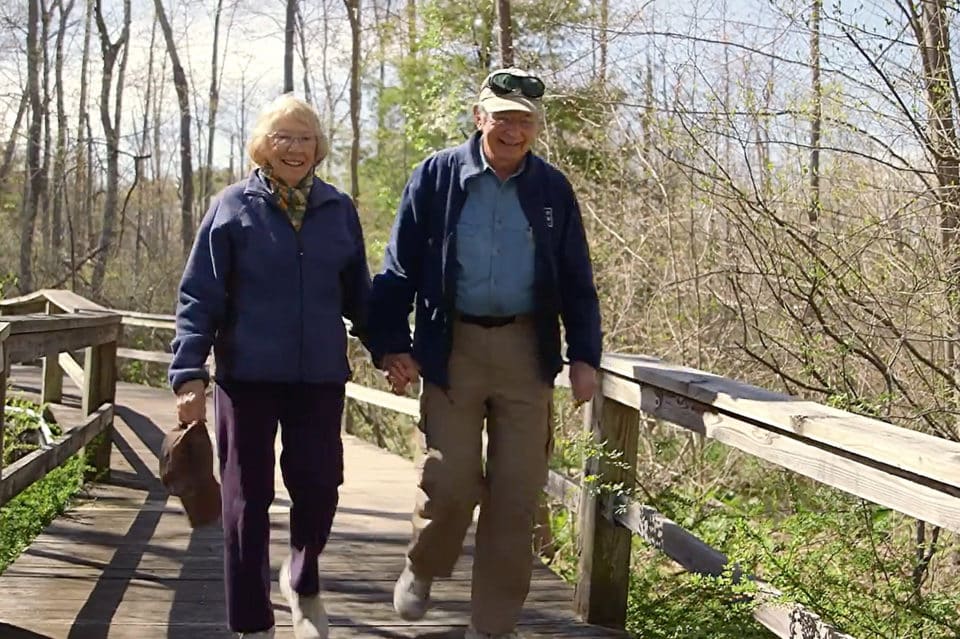As people age, their social circles often shrink due to retirement, health issues, or the loss of loved ones. While these changes are natural, they can also lead to isolation and loneliness. This means that socialization isn’t just about having fun or passing time — it’s essential for mental, emotional, and physical well-being. Understanding the importance of community for seniors and exploring pathways to develop it can significantly enhance older adults’ quality of life.
The Impact of Loneliness on Seniors
Loneliness is a noted public health concern. According to the 2023 National Poll on Healthy Aging, “one in three adults age 50–80 (34%) reported feeling isolated from others in the past year,” while “37% reported feeling a lack of companionship.” Although occasional solitude can be restorative, prolonged isolation has been linked to a range of serious health issues.
The Health Risks of Loneliness
Loneliness can have a profound effect on both mental and physical health. Research shows that chronic loneliness is associated with:
- Increased risk of cognitive decline: Studies indicate that those who experience loneliness are at a higher risk of developing dementia or Alzheimer’s disease.
- Higher rates of depression and anxiety: People who lack social interaction often report higher levels of depression and anxiety, which can negatively affect sleep, appetite, and motivation.
- Increased risk of heart disease and stroke: Prolonged loneliness can lead to higher levels of cortisol, the body’s stress hormone, which increases the risk of cardiovascular disease.
- Weakened immune system: Loneliness has been shown to weaken immune response, making adults more susceptible to illnesses and infections.
These health risks highlight the critical need for maintaining meaningful social connections as part of a holistic approach to aging well.
The Power of Community for Seniors
Community can be a lifeline — providing friendship, a sense of purpose, and opportunities for personal growth. A strong support network can have a powerful impact on mental, emotional, and even physical health. The benefits of a supportive community include:
- Improved emotional well-being: Interacting with others can reduce feelings of loneliness and anxiety, leading to better mental health outcomes. Sharing experiences, laughter, and support within a community can be deeply fulfilling.
- Cognitive stimulation: Conversations, games, and group activities keep the mind active, promoting brain health. Adults who stay socially engaged often experience slower cognitive decline.
- Bolstered physical health: Community activities, like fitness classes or group walks, promote physical well-being. People are more likely to stay active when surrounded by peers who encourage participation.
- Heightened sense of purpose: Being part of a community can give seniors a renewed sense of purpose. Activities like volunteering, mentoring, or leading hobby groups provide opportunities to feel valued and needed.
How Older Adults Can Build a Stronger Community
There are many ways to cultivate a sense of belonging and community, even if you live alone. Building a support network doesn’t have to be difficult — it just takes a little effort and openness to new experiences.
Practical Ways for Seniors to Build Community
- Join senior centers: Local senior centers offer a variety of social, educational, and recreational activities. These spaces are designed to promote interaction and friendships among older adults.
- Participate in hobby groups or clubs: Book clubs, gardening groups, knitting circles, and bridge clubs are all great ways to meet like-minded people with shared interests.
- Try group fitness classes: Yoga, water aerobics, and tai chi classes are popular among older adults and offer both health benefits and social interaction.
- Volunteer in the community: Many adults find fulfillment in volunteer work. From mentoring young people to helping local charities, volunteering provides an opportunity to connect with others while giving back.
- Embrace technology: Those who are comfortable using smartphones, tablets, or computers can join online forums or virtual support groups. Apps like Zoom and social media platforms make it easier to stay in touch with family and friends, even from a distance.
- Consider community living: Moving to an independent living community offers built-in social opportunities, such as events, fitness classes, and shared dining experiences. These communities foster a sense of belonging and help seniors create meaningful, lasting connections.
The Role of Community Living in Senior Socialization
One of the most effective ways for older adults to develop a sense of community is by choosing community living. These communities are designed to encourage social interaction, provide access to activities, and foster friendships.
Living in a community setting helps active adults feel connected, engaged, and supported. From communal dining areas to planned group outings, every aspect of resident lifestyle is tailored to promote social well-being. Residents have access to shared fitness centers, game rooms, and libraries, making it easier than ever to meet new people and stay involved.
Discover Community and Connection at Duncaster
If you’re seeking an independent living community that prioritizes social well-being, Duncaster is an exceptional choice. Duncaster’s vibrant community offers residents the opportunity to stay active, engaged, and connected. From wellness programs and arts activities to fitness classes and group excursions, Duncaster fosters an environment where everyone can thrive mentally, physically, and socially.
Located in Bloomfield, Connecticut, Duncaster offers a range of living options and services designed to support older adults at every stage of aging. Here, residents build friendships, pursue new hobbies, and maintain an active lifestyle — all while benefiting from a supportive, caring community. Learn more about independent living at Duncaster today!
Socialization is essential as people age; it protects against loneliness, reduces health risks, and enriches life with joy, purpose, and connection. By embracing the power of community, older adults can lead healthier, more engaged lives. Don’t let isolation define your later years — discover how community living can open the door to new friendships, growth, and opportunity.
Duncaster is Hartford County’s premier nonprofit Life Plan community. Here on our 94-acre campus, you can enjoy an active lifestyle filled with friendship, art, culture, education, and wellness — plus exceptional service from our staff. Adjacent to LaSalette Open Space and its miles of lovely scenic walking trails, our community offers relaxed country living only minutes away from exciting dining and cultural experiences in and around Bloomfield. Learn more about our community or schedule a tour today to see why doctors, educators, entrepreneurs, musicians, and more call Duncaster home.






